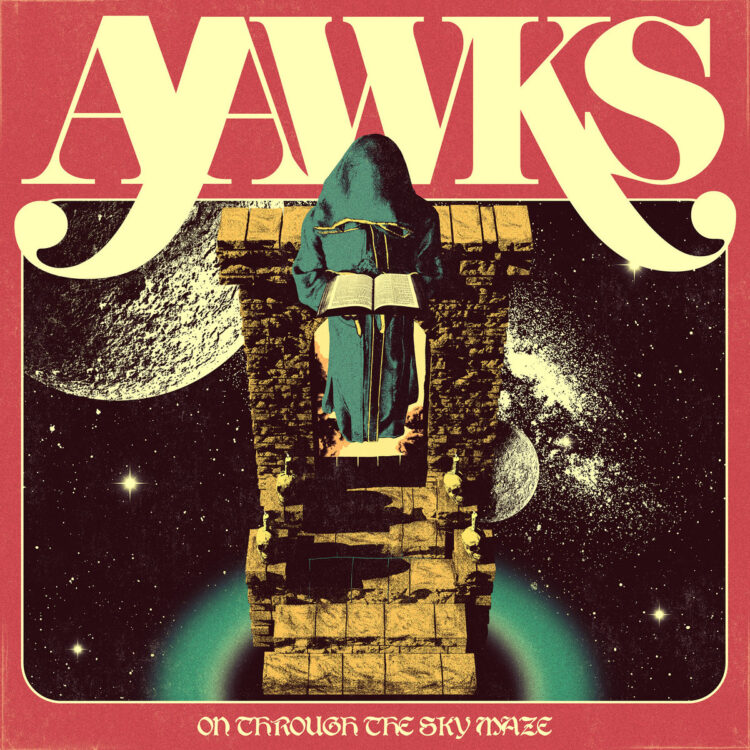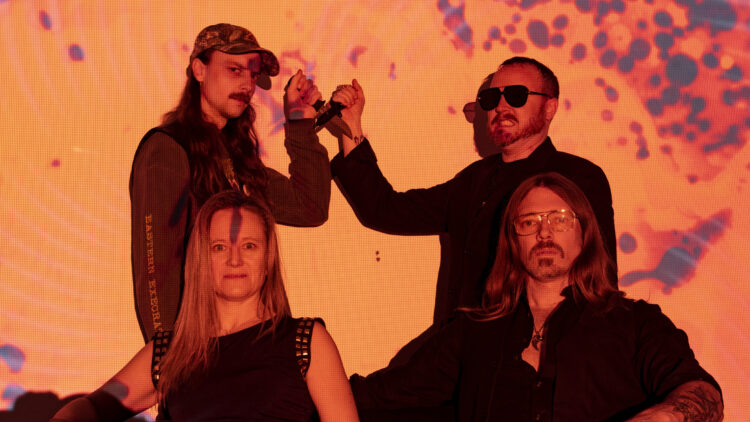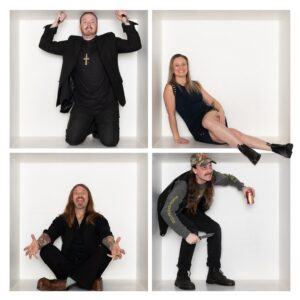
By Jim Barber
Steeped in mythology, drawing on influences that harken back to the late 1970s heavy, doom-laden musical tomes of early Black Sabbath, with healthy doses of the early psychedelia inspired sludge metal of Vanilla Fudge and Blue Cheer, Barrie, Ontario’s maestros of fuzz-infused, fantastical spacey metal music AAWKS are bringing their atmospheric intensity and fantastical themes to an ever-widening audience.
Their penchant for crafting music that is as theatrically revelatory in its aural textures is undoubted. But it’s the literate storytelling that accompanies each chapter in the band’s new album On Through the Sky Maze which really sets AAWKS out as a band to keep one’s eyes – and ears – upon.
After forming with an initial lineup in 2019 and releasing their debut EP, a more solidified lineup consisting of road-tested veterans of the Barrie and area music scene led to the band’s current roster in 2023, shortly after the issuance of their debut album, Heavy on the Cosmic.
That collection of talented and experienced players is headlined by primary songwriter, vocalist/guitarist Kris Dzierbicki, with his wife, Randy, on drums, longtime friend and musical accomplice Roberto Paraiso on guitar, violin and some synths and the most recent addition, bassist Ryan Mailman, who also contributes some of the guttural vocals and screams that punctuate some of the tunes on the album.
According to Kris, the band would like to keep the true meaning of their name a mystery, which fits in completely with their aesthetic and overarching creative vibe.
“It might mean something. It might be an acronym. And you can pronounce it however you want. Our guitarist Roberto always says that it’s a bit of a play of words on the animal because we’re big, heavy and slow, like an ox,” said Kris with a chuckle.
A number of epithets have been thrown at the band to describe its style, mostly to make things easier for music journalists and streaming platform programs. AAWKS has been dubbed as combinations of Heavy, Psych, Stoner, Doom, Fuzz Rock and more.
 “What I say is, ‘hey, do you know Black Sabbath?’ And most people say yeah. I then say it’s like if Black Sabbath wasn’t as talented and played slower but also maybe faster at times. With bands and genres and sub genres, especially in metal, the longer you hang around, every week or two there’s another subgenre that you could add on, another adjective to throw in there,” said Kris.
“What I say is, ‘hey, do you know Black Sabbath?’ And most people say yeah. I then say it’s like if Black Sabbath wasn’t as talented and played slower but also maybe faster at times. With bands and genres and sub genres, especially in metal, the longer you hang around, every week or two there’s another subgenre that you could add on, another adjective to throw in there,” said Kris.
“And now the term ‘Blackened’ seems to be coming up more and more, and its kind of seeped into all the different genres. There’s even Blackened Pop. But to me, for what we do, Black Sabbath was the birthplace. And then you have all the birthplaces of Stoner, like Deep Purple and Led Zeppelin, there’s a bunch. And then your birth of Punk would be, say, The Kinks and later The Stooges. I think what happens is that people are so blown away by these pioneering bands they try to make their own version of it, and it comes out sounding a little different. With us there’s Sabbath and then Vanilla Fudge and even some Cream.”
Randy and Kris have been a couple for a number of years. When there was still some flux to the lineup of what would become AAWKS, Kris asked Randy to take her natural sense of rhythm, exuberant personality and love for rock and roll and learn how to play the drums.
Working with Zeus’ (another band from Barrie) drummer and drum instructor Rob Drake, and with countless hours of dedicated practice, Randy became proficient enough to record drum tracks for AAWKS’ first full-length album. The sophistication of the rhythmic aspect of the band’s new album On Through the Sky Maze demonstrates that Randy has taken to her new instrument with aplomb and not only improved but evolved as a percussionist.
“I did a few lessons because I had never played a musical instrument, ever. Rob was really great at understanding how I might learn and be able to play catch-up. And Kris was able to take that kind of simple Meg White [White Stripes] feel of what I could do and make it work. That’s what you hear on the first album, it was a really simplified beat, so that I could keep up with the rest of them. I guess I am a fast learner,” she said, adding that the proof in the proverbial pudding came when the band started playing live, where one never knows from night to night what the onstage sound might be, making it doubly challenging for a relative newcomer on such an integral instrument as the drum kit.
“I’d say that about 60 per cent of the places we play don’t even have a drum monitor. Because we’re playing in a lot of dive bars and underground basement clubs and whatever. So a lot of it is just watching for key moments with Kris. I kind of feed off either his words or his playing, depending on the song. Everything is a mathematical pattern for me.”
In terms of the songwriting for AAWKS, Kris plays a primary role, inviting his bandmates to add their suggestions and particular nuances on every song.
“When the song is in its baby form I will bring it to the band and that’s when it really takes shape a lot of the time. Solos or certain riffs might get adjusted once the band starts playing them.” he said, adding that the lyrics are pretty much exclusively his domain, giving him an opportunity to comb through his passion for fantastical, mythological, epic storytelling, which is in abundance on On Through the Sky Maze.
“A lot of it is allegorical or symbolic and relates to things I’ve been through. But I’m not like a folk, singer/songwriter type, and I don’t really want to write about my personal love life or anger or depression. I want to coat it with something fantastical. And that’s maybe the thing I like most about psychedelic music [or ‘Psych’] is no matter how heavy or soft or whatever the genre is, you can make anything psychedelic – it’s a kind of music that takes you somewhere mentally. So I want my lyrics to do that too.
“As far as subject matter I’ve always been into a lot of classic science fiction like Isaac Asimov and Ray Bradbury and George Orwell – stuff that has a message. But I also have read a lot of non-sci-fi non fantastical stuff like Charles Bukowski and Albert Camus, stuff that’s more philosophical. I read a lot of books when I was growing up. What I’ve done over the last 10 years since I’ve become addicted to the internet is read articles instead of reading entire books. If I really get into some subject, I’ll go down a rabbit hole on the internet and, hey, maybe it’s not all vetted, but I am picking up some information and getting ideas for stories.”
The actual construct of a song starts with the guitar nearly all of the time, Kris said.

“I’d say 99 per cent of the time it usually starts with a riff. Sometimes I’ll come up with a drum beat because I am writing the drum part and then teaching it to Randy. So if I feel a certain beat or rhythm I will start building on that. But there are also times when a song comes almost fully formed where I may have one riff, but it quickly cascades into the whole song. That doesn’t happen often, but when it does, it’s nice,” he explained.
“Other times, you’ve got to wrestle them for quite a while, like months and months and sometimes even years on end before they actually become a song that works. But, yeah, it’s usually a riff and then the words will come after that. I am always writing verses and coming up with interesting takes on things. If we’re watching a movie or reading an article about Vikings or some kind of occult thing, that might seep into the song. When we’re on the road I may get inspired and a riff or melody line or phrase will just come, and I will record it. But I also have notebooks all over the jam space that are all full of finished and half-finished lyrics.”
The lead-off track on the album, ‘Celestial Magick’ is a great introduction to the overall tone, vibe and ethos of AAWKS, and is based on a truly evocative, but little-known story from Norse mythology, which Kris, Randy and the band adapt to create a doom-laden, sludgy epic that pulls the listener into another realm.
“That was one of those where I was reading about some weird Viking stuff, and I got on this thread about Viking burial rituals and some of their practices. They had this idea that if you don’t trim the nail tissue and the hair of the dead, which should have been trimmed when preparing the body to please the gods, it would go onto a ship called Naglfar. This ship is made of demons and ghouls and on Doomsday the ship would be cast out onto the world to create destruction and havoc and death. And I thought it was a cool thing to write about such an incredible visual,” Kris said of the song.
The most Sabbath-like song on the record – and unabashedly so – is ‘Lost Dwellers,’ which features one of the most hypnotically thick soundscapes and insistently potent bass lines this side of Geezer Butler or Lemmy.
“We were on tour with a great band from Montreal called Sons of Arrakis. They’re a killer band, so that was me trying to write a Sons of Arrakis song. But then I also paid homage to – or ripped off – part of [Black Sabbath song] ‘Children of the Grave,’ that kind of chunky part in the riff, which I’ve always loved. And like most of my songwriting, I had a visual, like a movie playing in my head the whole time I was writing it,” he said.
![]() “It’s been probably two and a half years since I wrote that song, but I can remember picturing a planet that was on the verge of exploding – a dying planet. And this group of people were given an omen, a sign that they needed to leave the planet and were offered this portal to a different place.”
“It’s been probably two and a half years since I wrote that song, but I can remember picturing a planet that was on the verge of exploding – a dying planet. And this group of people were given an omen, a sign that they needed to leave the planet and were offered this portal to a different place.”
One of the most evocative and stirring songs on the album is the hauntingly enigmatic ‘Caerdroia.’
 “Caerdroia is a Welsh term for labyrinth. And I didn’t know that a labyrinth was different from a maze until I started reading about them. A labyrinth has no wrong turns. So you go in and you reach the middle section and then come back out. It’s for meditative purposes, not a place to trick you and where you can get lost. And in my mind, a labyrinth has high walls and I imagined it during the summer solstice and there was a pagan ceremony with this group of people who get stuck in the labyrinth forever,” Kris said, pointing out how the influences already discussed include Norse mythology and Welsh folklore, but that some of the songs, such as the cinematic ‘Cursed Soul,’ come straight from his affinity for the modern horror genre.
“Caerdroia is a Welsh term for labyrinth. And I didn’t know that a labyrinth was different from a maze until I started reading about them. A labyrinth has no wrong turns. So you go in and you reach the middle section and then come back out. It’s for meditative purposes, not a place to trick you and where you can get lost. And in my mind, a labyrinth has high walls and I imagined it during the summer solstice and there was a pagan ceremony with this group of people who get stuck in the labyrinth forever,” Kris said, pointing out how the influences already discussed include Norse mythology and Welsh folklore, but that some of the songs, such as the cinematic ‘Cursed Soul,’ come straight from his affinity for the modern horror genre.
“Over the last few years, I’ve really got back into horror movies. I watched a lot growing up but went away from them for a while. This song is about a séance and, like the theme of some of the other songs, a character gets pulled from one place into another. And when I was writing it, I was fully invested in the visuals in my head and trying to translate them into a song. I remember reading about something called the Seventh Sense and using it to raze the sky and of course raze in this sense means to completely and utterly destroy something. I was interested in how this Seventh Sense is the awareness of ourselves in three-dimensional space. So this spirit embodies the person who is in the séance and then destroys everything around it. I think it’s a very visual song,” Kris explained.
“Most of the songs we’re talking about are related to the underlying theme of the album which is movement from one place to another, or different versions of life and death.”
Like many bands whose members have day jobs, extensive touring is a challenge, but in the wake of the release of On Through the Sky Maze, AAWKS will try to get out for runs of three and four dates at a time, which includes some shows in Ontario later in May opening for Montreal’s Sandveiss in Toronto on May 23 at the Bovine Sex Club, followed by a show at The Mansion in Kingston on Saturday May 24.
For more information on the band, visit https://www.aawks.ca.
- Jim Barber is a veteran award-winning journalist and author based in Napanee, ON, who has been writing about music and musicians for more than 30 years. Besides his journalistic endeavours, he works as a communications and marketing specialist, and is an avid volunteer in his community. Contact him at jimbarberwritingservices@gmail.com.
